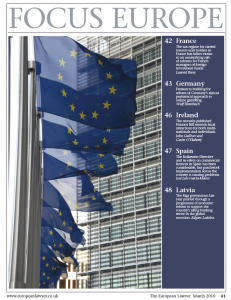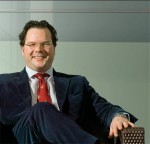Focus Europe, Germany: On-line flutters
Germany and its federal states have so far adopted an almost puritanical approach to on-line gambling, but, reports Wulf Hambach, pressure is building for legislative reform.
The Interstate Treaty on Gambling (ITG), which came into force at the beginning of January 2008, forms the centre of Germany’s gaming legislation, and has been the trigger for hundreds if not thousands of court cases causing divergent decisions.
The treaty aims at the continuation of the state’s monopoly and a general prohibition of the brokering of on-line games by 2011. To implement this prohibition, the treaty also provides for the issue of suspension orders to German internet service providers.
After having received the draft of the new state treaty, the European Commission started the notification procedure. In March 2007, the EU Commission issued an opinion against Germany in which it determined that the prohibition of the on-line operation and brokerage of gaming was not in compliance with the freedom of services according to Article 49 of the EC treaty.
Harsh criticism
However, this harsh criticism has not driven the federal state prime ministers nor regional parliaments to consider a revision. The draft came into force slightly more than two years ago without amendments and, as anticipated, the European Commission immediately started infringement proceedings with a letter of formal notice issued on 31 January 2008.
Apart from the general legal considerations regarding the lack of suitability or necessity of the proposed general prohibition of on-line gaming, there are also considerable technical factors that would hinder local restrictions on on-line services in Germany.
First, a general on-line prohibition coupled with blocking measures could be circumvented easily because of the decentralised structure of the internet. Second, it is technically impossible for the gaming operator to identify the exact location of the user.
This is particularly relevant regarding enforceability and could render the treaty as a toothless tiger that is trying to threaten banks, access providers and the e-gambling industry. Once blocking orders have been issued and the legality has been examined in court, the toothless tiger will realise its weaknesses.
Booming black market
The unenforceability of the internet gambling ban causes another danger that has recently re-appeared in Germany – the growth of the black market. At the end of November 2009, German soccer legend Franz Beckenbauer told the leading German sports magazine Sportbild: ‘The [German] sports betting monopoly causes a growth of the black betting market in Germany. The goal should be to open up the market for fit, proper and licensed betting companies, as requested by the German Olympic committee.’
Thus, another pivotal argument used to justify the existence of a German betting monopoly – combating accompanying crime – seems to be falling apart. Newspapers across Europe are full of the recent betting scandal, which seems to be turning out to be the continent’s worst-ever case of match fixing in soccer. German prosecutors revealed last month that as many as 200 games across Europe are thought to have been rigged. Games played this season in Germany, Belgium, Switzerland, Croatia, Slovenia, Turkey, Hungary, Bosnia-Herzegovina and Austria are now under suspicion. It is believed that none of the suspicious games involved any of Europe’s top leagues, such as those in Italy, Spain and England. The 32 German matches involve clubs extending from regional leagues up to the country’s second division. Just four years after the ‘Hoyzer betting scandal’ – involving referee Robert Hoyzer – this is the next major organised criminal activity on Germany’s black (betting) market.
As if he saw it coming, Austrian economist and illicit sales expert Friedrich Schneider recently researched the impact on the growth of the black market of banning private betting in Germany. His findings stressed that the drop in turnover in the public gambling sector in 2008 (between 12 to 30 per cent) was accompanied by a simultaneous growth of the black market.
Professor Schneider pointed out that those who intend to gamble on the internet will not be deterred by a written ban. The associated loss of jobs, tax revenue and added value for the German economy as a result of a lack of advertising proceeds led him urgently to recommend at least a partial liberalisation.
Reform afoot
Politicians are beginning to take serious steps towards legalising internet gambling. In a statement issued at the beginning of last September, the parliamentary leaders of the German Liberal Party, the FDP, called for a reform of the ITG, and stressed that experts in the fields of addiction, economics and law were all opposed to a ban on internet gambling as a suitable tool for regulating online gaming.
In particular, Detlef Parr, former member of the Bundestag and FDP expert for sports affairs, addiction and illegal drugs, stressed the need for reform and called for the ITG to be terminated by the federal states ahead of schedule so that suitable reform can be expedited.
This would decriminalise internet games such as sports betting and on-line poker for players and organisers, while continuing to protect players and simultaneously securing funding for charities.
Jörg Bode, the new Minister of Economy of the Federal State of Lower Saxony, and the FDP spokesman on gambling issues, opposes the current ITG and, in view of its ongoing evaluation, has demanded an in-depth study into the impact of the treaty.
Now, less than three months after the FDP statement, reform might be on the horizon, as the northern German state of Schleswig-Holstein officially announced its intention to terminate the ITG at the end of 2011. Therefore, according to newspaper reports, it is unlikely that the federal states will agree a new ITG for 2012.
Addiction dangers
It has long been argued that to combat addiction dangers, the treaty must prohibit on-line games of chance in Germany. However, experts maintain that prohibition is not a suitable measure to achieve that objective. Rather, it is argued, providers will simply relocate their business to other countries, resulting in loss of jobs and revenue for the federal states.
It is estimated that there are some 3,000 websites offering games of chance on the internet, and they are being used by an increasing number of people. Schleswig-Holstein strives to privatise games of chance and, at the same time, to co-operate with the providers to ‘agree on sensible prevention measures’.
Since the introduction of the ITG in 2008, the federal states’ revenue from gambling has dropped by 30 per cent, according to the Deutsche Lottoverband, the Association of German Lotteries. At that rate, total loss of turnover could be nearly 14 billion by the scheduled end of phase 1 of the treaty in December next year.
The obvious consequence is that the respective taxes and earmarked funds that gambling operators pay to the federal states will continue to decline, hurting the fiscal interests of the federal states and reducing support for charitable projects.
As the EU’s leading economy, Germany should be a frontrunner in forming and using modern gambling with the customers’ wishes to play on websites that are controlled and safe to use, as well as being in accordance with EU law. Instead, elements of German society remain highly resistant to reform and stick to measures that resemble the internet censorship applied in China. As a result, Germany’s gambling law is a target for the European Commission and the European Court of Justice.
Published by Dr. Wulf Hambach in “The European Lawyer” issue 94 March 2010 p. 43-46


